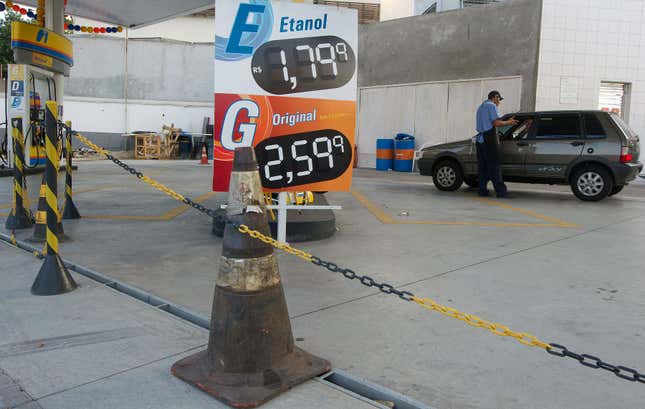
[ad_1]
Politicians, Huge Ag, and main automakers like Toyota and Volkswagen are all conspiring in Brazil to take care of ethanol’s lead on the expense of EVs. Brazil’s flexible-fuel vehicles, which may run on a mixture of ethanol and gasoline, have lengthy been the preferred automobiles in the marketplace, however these “sugar-cane vehicles” are threatening the adoption of fully-electric vehicles within the South American nation, as Bloomberg reviews. And regardless of the recognition of flex-fuel ethanol vehicles, it’s not all essentially within the palms of consumers.
Ethanol-burning vehicles have ties to Brazil’s sugar trade, which wields nice energy and affect. Brazil is the world’s largest producer of sugar cane; the trade reportedly gave beginning to the nation’s agricultural elite, again when this small group amassed wealth off the backs of slaves introduced in from Africa. Within the ensuing a long time, the sugar trade grew in energy, and by 1979, had discovered one other area of interest in pure ethanol-powered vehicles imported by Fiat.
These sugar-cane vehicles had been cheaper to run than gasoline-powered vehicles, and made Brazil much less susceptible to petroleum shortages, which decimated the nation’s financial system within the ’70s. As you would possibly count on, consumers reacted nicely to those vehicles they usually gained a gentle following.

However it wasn’t till Volkswagen launched the Gol Flex in 2003 that ethanol-powered vehicles actually took off . The Gol Flex popularized flex-fuel vehicles, which run on a mixture of ethanol and fuel, and these shortly dethroned pure gas-burning automobiles in the marketplace. For reference, flex-fuel vehicles accounted for 84.5 % of the nation’s total auto gross sales in June 2023, per Bloomberg.
Till the arrival of EVs, sugar-cane vehicles had been a boon fairly than curse. These vehicles helped Brazil obtain comparatively low ranges of carbon emissions: Bloomberg cites analysis that places the lifetime emissions of Brazil’s sugar-cane vehicles at round 16.7 tons of carbon dioxide every versus the 40 to 50 tons emitted by related combustion fashions around the globe. As a result of this, these vehicles helped Brazil decrease its emissions in comparison with most developed economies and different “middle-income, populous nations like Russia or Mexico.” Keep in mind, it’s not like Brazil is a few scantily-populated nation: São Paolo is essentially the most populous metropolis exterior of Asia, and fourth largest metropolis on the earth based mostly on inhabitants.
The truth that sugar-cane vehicles helped Brazil curb its emissions to an important diploma whereas saving Brazilians cash firmly entrenched their reputation. However the vehicles are actually getting in the way in which of EVs, and are threatening to place Brazil additional behind the remainder of the world because the auto trade transitions to fully-electric vehicles. Regardless of EVs having lifetime emissions round half (8 or 9 tons of CO2) that of sugar-cane vehicles, the federal government of Brazil appears unwilling to let EVs succeed. And business pursuits from Huge Ag and Huge Auto play a job, too:
“It isn’t about denying the electrical automobiles, however ethanol nonetheless holds a spot in Brazil’s journey for the subsequent 10 to fifteen years, particularly as a result of hybrids enhance effectivity,” mentioned Paula Kovarsky, chief technique officer at Brazil’s greatest sugar-cane processor, Raizen.
It doesn’t assist that EVs in Brazil simply value double what ethanol-powered automobiles just like the flex-fuel Toyota Corolla value. Due to the nation’s cussed devotion to sugar-cane vehicles, incoming EV makers from China like BYD and Nice Wall Motors are actually planning to make flex hybrids, in a surprising reversal of the Chinese language carmakers’ onward march in direction of an EV future.
The continued failure of EVs within the nation is a disgrace, contemplating Brazil has one of many cleanest energy grids on the earth, producing over 80 % of its electrical energy from renewable sources. Right here’s Brazil’s probability to be one of many cleanest auto fleets on the earth, however a mildly cleaner and cheaper model of combustion is threatening its fully-electric future.

[ad_2]